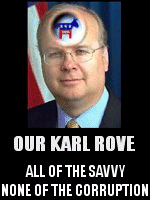Democrats,
No, I'm not going jive on you. You is better than me. When running for office (or, in fact, leading any organization), people utilize different levels of leadership in an effort to more effectively connect with their target audiences. During campaigns, voters have the ability to sense the level of leadership a candidate has mastered. And this matters, big time.
What do levels of leadership have to do with you being better than me? A lot -- and they're already having an effect on the 2008 primaries and presidential race. But before we jump right into the current races, it's important to see how leadership levels, and you and me, have played a critical role in prior elections...
A Look Back
The 2000 Election (Bush v. Gore) key messages:
- George W. Bush ran on a lot of ideas (compassionate conservatism, lower taxes, unity [ha!]), but his campaign could be summed up as "I'm the guy who's more or less just like you, so of course I'll represent you the best in the White House."
- Al Gore ran on a lot of ideas as well, which can be summed up as "I'm more responsible than Clinton, and I'm just plain smarter than Bush."
The big idea here is that one candidate had the confidence and wherewithal to always remember who he was courting, and was able to keep his head above water. People see this as a signal of superior confidence and leadership skills. And in national politics, these feelings can trump specific policy platforms (read this sentence a few more times, Democrats).
Now, onto the 2004 Election (Bush v. Kerry) key messages:
- George W. Bush ran on "I'll keep you safe."
- Kerry ran on "I'm ready for duty, and I'm just plain smarter than Bush."
Onto the Democratic Primaries
So, how do the Democratic candidates measure up to the you is better than me leadership approach?
Hillary Clinton (primarily) focuses on the predictable Democratic message of "me"...
- I'll be ready on day one
- I am more experienced
- I am a woman
- I'm going to worry about you every day
- I'm going to fight for you
- I care about you and your troubles
Barack Obama (primarily) focuses on a less conventional message of "we"...
- Together, we can change America
- We are the ones we've been waiting for
- I did not vote for the war
- I will bring people together
- I will change the tone in Washington
So, where do they stand? The answer lies in a simple leadership level calculus: You > We > Me. Simply put, you-first messages are stronger than we-first messages, are both are stronger than me-first messages.
If Hillary plans on winning, she's going to need to shift her focus from the less powerful me-first messages to her more meaningful you-first messages (she'll also need to clean them up to be less pessimistic). She can do this, but it's not very likely due to her depressingly piggish chief strategist Mark Penn.
If Hillary somehow does manage to shift to you, then Obama's movement-like 'we-first' messages get trumped -- he'll have nowhere to go but back to his store of weaker me-first messages. See the problem for Obama? He doesn't have any substantive you-first messages (did you catch that, Mr. Axelrod?). Fascinating.
The General Election
No matter who wins the primaries, Democrats will have a leg up on John McCain. Because, you guessed it, McCain is a me-first candidate:
- I am a war hero
- I am a maverick (ooh, sorry, I mean 'conservative,' my friends)
- I was for the surge when nobody else was
- I called for Rumsfeld's resignation when nobody else did
- I co-wrote McCain-Feingold (notice whose name is first, my friends? Yeah, thought you did.)
To John's credit, he does try to use some we messages as well, but these are secondary and not very popular with his base. Sadly, we as a pronoun rings very socialistic to Republicans.
Barring extraordinary factors, we can use the You > We > Me leadership level calculus to predict who has the best chance of winning races...
The Primary Calculus
Barack's we beats Hillary's me unless Hillary can quickly shift her message to one that says you matter more than she does.
The Election Calculus
Barack's we beats McCain's me. Even if McCain reaches into his backup store of we messages, it'll be hard to compete with Obama's primary we messages.
Clinton's me ties McCain's me, but Clinton has a backup supply of you messages she can deploy for the knock-out punch against McCain's backup selection of we messages.
In the end, while this is all instrumental to success, there is a very simple lesson for any candidate to glean: Voters are the ones voting. Think of them first, and the right words will follow.
